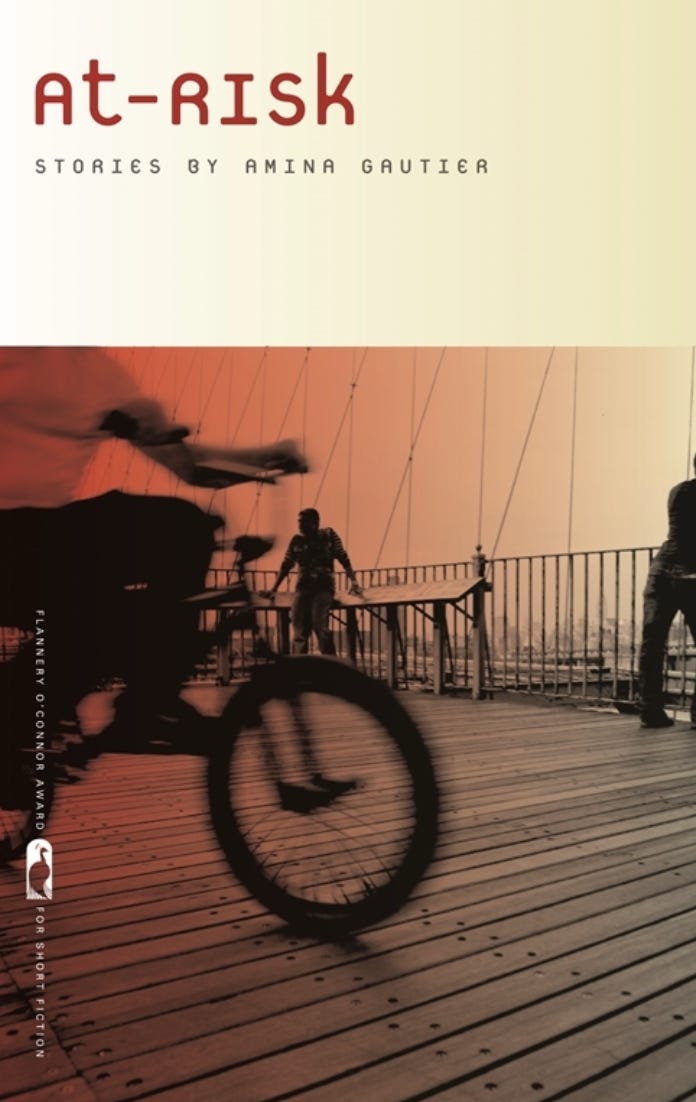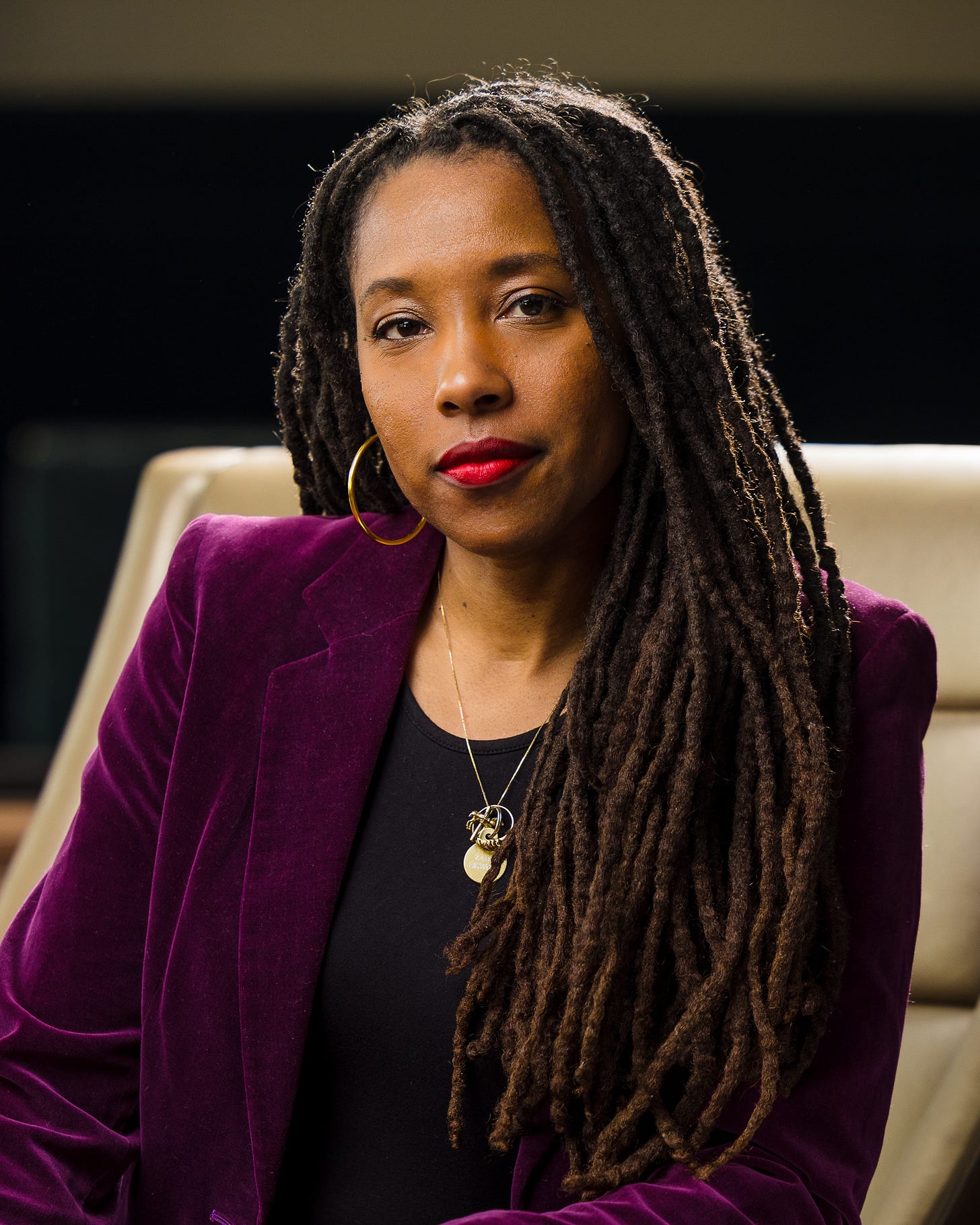A Book I Wish More People Knew About Vol. 9
Stories of Black Brooklyn in the 1980s and '90s, recommended by Kristen Gentry
Kristen Gentry’s much-anticipated collection Mama Said—praised by Kirkus, in a starred review, as “a celebration of Black family life that will make you laugh and cry in equal measure”—is coming from West Virginia University Press on October 1. It was one of the last books I signed before leaving WVU, and I can personally attest to its power. Here Kristen recommends another collection of short stories: Amina Gautier’s At-Risk, winner of the Flannery O'Connor Award for Short Fiction.
A Book I Wish More People Knew About: Kristen Gentry on Amina Gautier’s At-Risk
“I done told him. If he wanna go out there and get heatstroke that’s on him.” This was my cousin telling me about her sixteen-year-old son about to stroll into ninety-degree heat wearing a hooded sweatshirt, days after my boyfriend’s nephew arrived at our house to move heavy furniture on an eighty-five-degree day, also wearing a hoodie.
The conversation led to a good ol’ rant about what’s wrong with kids these days. Afterward, I watched video of a sixteen-year-old boy in Montgomery, Alabama, swimming across the Alabama River to aid a co-worker being jumped by white men and felt bad.
These kids are facing obstacles that even the adults guiding them are often ill-equipped to navigate. With unabashed racism manifesting in mass shootings, deadly police brutality, bullshit laws stripping them of rights, education bent on erasing the truth of their history (and consequently, their present), it’s no wonder that Black youth seek the comfort of clothing that allows them to hide the bodies that so many want to still via complacency, imprisonment, or death. Days spent hefting the responsibilities of adulthood can tint nostalgia for younger years a bright, Barbie pink. But immersion in one or two good coming-of-age tales, like those found in Dr. Amina Gautier’s collection At-Risk, can scale those memories back to a truer hue.
Gautier is an undeniable short story-writing force. A slow scroll through her lengthy accomplishments, which include one hundred and forty-five published stories, multiple awards for each of her four short story collections, and the PEN/Malamud Award for Excellence in the Short Story, will make that abundantly clear.
I was introduced to At-Risk at the 2012 AWP (Association of Writers and Writing Programs) conference, while attending a panel featuring Gautier reading “Girl of Wisdom.” I don’t remember if she read the story in its entirety. I’ve read it so many times now, after rushing to purchase the book following the panel, that I can’t divorce myself from knowing what becomes of fifteen-year-old Melanie’s encounter with an “old man.” I only remember my stomach clenching as she “walks to the man’s car” and accepts his invitation—“Get in”—because my stomach still clenches when I read the story. I still marvel at the way the old man’s character shifts smoothly, swiftly, from predator to potential protector with each line of dialogue, leading me—at times—to question the need for my caution. He picks up an obviously underage girl after she teases him: “You better go get you some Viagra before you think you can handle me, grandpa!” He questions her character and intentions, asking: “And what do you want to do? Nice girls don’t get into cars with strangers. . . . Then again, you don’t look like such a nice girl.” He takes her to his home where he urges her to eat and tells her she’s “probably worrying [her mother] to death.” I still want to yell to Melanie even though I know there is nothing I can do to change the course of the inevitable. Her fate has already been written, and masterfully so.
The stories in At-Risk are set in Brooklyn in the late 1980s and early 1990s, so the young characters in this collection don’t live lives inundated with social media. They create identities according to what the world wants and expects from them with no help from technology.
In “The Ease of Living,” fifteen-year-old Jason is sent to spend the summer with his grandfather in Tallahassee after his friends, Stephen and Kiki, are murdered. When Jason’s grandfather asks what basketball player he likes, the third-person narrator offers readers Jason’s lengthy and deeply contemplative internal response:
Jason thought of Michael Jordan’s Gatorade commercial with everyone singing, “I wanna be like Mike.” What he wouldn’t give to be like Michael Jordan, have Michael Jordan’s money, his skill, his arrogance and confidence, his nobody-can-touch-me bravado. What he wouldn’t give to linger in the air like he was free from all restraints, switch hands middunk, and keep everyone constantly guessing, constantly watching, waiting for his next move, hanging on him, all eyes reflecting his image so that he saw himself wherever he went. What else was there for him if he didn’t want to be like Mike? . . . No one believed in school anymore. Just a place to contain society’s knuckleheads and keep them off the streets for a few hours. In school, he was expected only to pass the tests that would move him into the next grade. . . . He was not supposed to think. All of the students who could think had been weeded out. . . . He and his friends were leftovers.
Externally, Jason simply replies, “I like Jordan. He’s nice on the court,” unwilling to admit his severely diminished self-worth.
Gautier’s skilled crafting strips characters to the bareness of their truest fears and desires. In her care, they “exist and can be seen as they are.” In “Yearn,” the book’s final story, which chronologically precedes the first story, “The Ease of Living,” Jason’s murdered friends, Stephen and Kiki, are very much alive, though their imminent deaths loom heavy in every word. Gautier’s refusal to bridge the gap between possibility and certain tragedy leaves readers forever hoping for brighter futures that will only be realized for some—forced to accept these young characters with all their flaws and to let kids be kids.
Kristen Gentry received her MFA from Indiana University. Her award-winning fiction has been nominated for a Pushcart Prize and appeared in Crab Orchard Review, Jabberwock Review, and other journals. She is a VONA and Bread Loaf Writers’ Conference alumna, former Director of Creative Writing at SUNY Geneseo, and a member of the inaugural Poets & Writers publicity incubator for debut writers. She lives and writes in her hometown of Louisville, Kentucky, helping other black women and girls share their stories.
Previously in “A Book I Wish More People Knew About”
Vol. 1: The Actual True Story of Ahmed and Zarga, recommended by Phyllis Mann.
Vol. 2: Laura & Emma, recommended by Teddy Wayne.
Vol. 3: The Woman Lit by Fireflies, recommended by Christine Sneed
Vol. 4: This. This. This. Is. Love. Love. Love., recommended by Casey Plett
Vol. 5: The Breaks by Julietta Singh, recommended by Neema Avashia
Vol. 6: The Circus Train by Judith Kitchen, recommended by Beth Kephart
Vol. 7: The Story of the Paper Crown by Józef Czechowicz, recommended by K.E. Semmel
Vol. 8: The Book of the City of Ladies, recommended by Kathleen B. Jones





